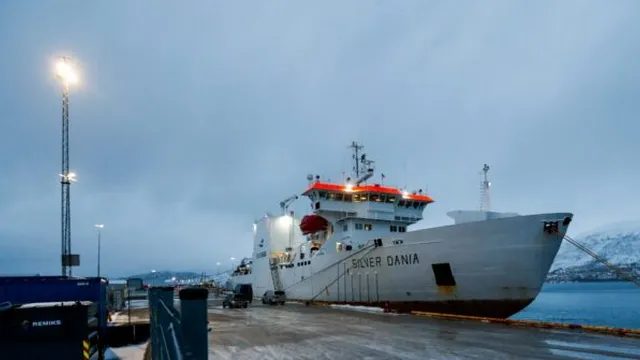
Norwegian police seize ship suspected of damaging underwater cable
2025-02-01 13:42- A Norwegian-owned vessel, the Silver Dania, has been detained by Norwegian police on suspicion of causing damage to an undersea fiber optic cable.
- Authorities detected cable damage in the Baltic Sea last weekend and have since opened investigations into several ships, including the Silver Dania.
- CEO Tormod Fossmark denied involvement of the Silver Dania in any wrongdoing, emphasizing the ship’s compliance and cooperation with the investigation.
Express your sentiment!
Insights
In recent investigations, Norwegian authorities took action after suspicions arose regarding a Norwegian-owned ship, Silver Dania, and its involvement in damage to an undersea fiber optic cable connecting Latvia and Gotland, Sweden. This incident unfolded in the Baltic Sea, where severe cable damage was discovered last weekend. Following this, police acted on a request from Latvian officials and a ruling from a Norwegian court, leading to the detainment of the Silver Dania, a vessel with an all-Russian crew, as it sailed between Russian ports. The damage to the fiber optic cable, critical for data transmission between the Baltic nations, was detected on a Sunday, prompting Swedish prosecutors to initiate a preliminary sabotage investigation the same day and order the detention of a Malta-flagged ship, Vezhen, also suspected in the cable damage case. The Swedish prosecutor, Mats Ljungqvist, expressed the belief that the Vezhen was responsible for the cable damage, emphasizing ongoing scrutiny over undersea infrastructure in the region. Tormod Fossmark, CEO of the SilverSea company, which owns the Silver Dania, firmly denied allegations of any wrongdoing, asserting that the ship did not engage in any activities that could have caused damage to the cable. Fossmark highlighted the vessel's tracking data, which they assert shows no irregularities in its voyage. Throughout the investigation, the police have been thoroughly inspecting the ship and conducting interviews without providing further details. The Baltic Sea region has experienced heightened scrutiny regarding undersea infrastructure since the start of Russia's military aggression towards Ukraine in 2022, which raised fears of potential sabotage of critical cables and pipelines. In a related incident, Finland had previously seized a Russian-linked oil tanker following a similar cable cut incident. The geopolitical context, underscored by ongoing tensions, emphasizes the significance of safeguarding critical undersea infrastructure in such vulnerable times and raises concerns about the stability and security of telecommunications in the region.
Contexts
Geopolitical tensions have a significant influence on maritime operations in Northern Europe, an area characterized by its strategic waterways and ports. The implications of these tensions often manifest in various ways, including increased military presence, changes in shipping routes, and alterations in trading relationships among nations. As nations assert their control over territorial waters, the risks of confrontations rise, impacting the safety and efficiency of maritime operations. Many countries have increased naval activities in response to perceived threats, with exercises and patrols often disrupting commercial shipping and creating an atmosphere of uncertainty for shipping companies and maritime stakeholders. The Baltic Sea and the North Sea are particularly susceptible to geopolitical tensions. These regions serve as critical conduits for trade and energy supplies, making them areas of focus for both regional and global powers. For example, tensions between NATO countries and Russia have led to complexities in maritime operations such as increased inspections, potential blockades, and changing regulations governing navigation in international waters. Moreover, the influence of such tensions extends to the shipping industry, leading to alterations in ship insurance premiums and rising costs for shipping due to the need for enhanced security measures. Regional conflicts, trade wars, and shifting alliances can also have profound impacts on maritime logistics. Countries may adjust their trading partners, leading to changes in cargo loads and shipping schedules. As nations respond to geopolitical dynamics, shipping companies must remain agile, adapting to new trade agreements, sanctions, or embargoes that can arise unexpectedly. This adaptability is crucial, as disruptions in maritime operations not only affect the movement of goods but can have far-reaching effects on national economies that rely on these trade routes. Furthermore, geopolitical tensions can lead to investments in port infrastructure and navy equipment as countries attempt to bolster their maritime capabilities. This arms race may drive technological advancements but also creates an environment ripe for competition and conflict. As nations fortify their maritime borders, safety and freedom of navigation become increasingly contested, underscoring the need for diplomatic efforts to manage these tensions. Effective international dialogue and cooperation are vital to ensuring that maritime operations in Northern Europe remain secure and uninterrupted despite the backdrop of geopolitical strife.